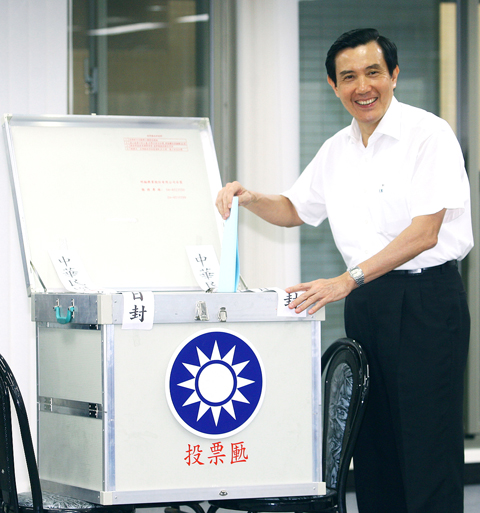The Chinese Nationalist Party (KMT) yesterday elected 32 Central Standing Committee (CSC) members, calling back several former members who had their election status revoked last year because of bribery claims.
Lee Chuan-chiao (李全教), one of those who lost his election status as a CSC member last year because of election bribery, received 1,079 votes and topped the election list.
He had denied the bribery accusations and filed a lawsuit against the KMT last year for annulling his election status, and won the lawsuit earlier this year.

PHOTO: CNA
Lee will take over as a KMT legislator once the KMT revokes the party membership of former KMT legislator Hsu Shu-po (許舒博), who was found guilty earlier this month in a second trial of accepting bribes from the National Chinese Herbal Apothecary Association.
Yao Jiang-lin (姚江臨), who was one of 12 former CSC members whose election status were revoked by the KMT last year, received the third-highest number of votes with 1,040.
Two other former CSC members whose election status was revoked, Hsu Sen-rong (許顯榮) and Chen Wen-han (陳文漢), were also elected yesterday.
The majority of CSC members are KMT lawmakers, as a total of 13 KMT legislators, including Chiu Yi (邱毅), Chang Hsien-yao (張顯耀) and Hou Tsai-feng (侯彩鳳), won seats in the election yesterday.
KMT Legislator Wu Yu-sheng (吳育昇), a long-term aide to President Ma Ying-jeou (馬英九), failed to secure a seat in yesterday’s election.
KMT’s Kaohsiung mayoral candidate Huang Chao-hsun (黃昭順) and Sean Lien (連勝文), son of former KMT chairman Lien Chan (連戰), did not seek re-election this year.
In his capacity as KMT chairman, Ma yesterday cast a vote in the CSC election and said the vicious tradition of bribery in CSC elections had abated in this year’s election.
Seeking to eliminate the bribery tradition and improve the image of the party, the KMT tightened regulations on CSC election campaigns in May and banned all kinds of bribery, including hosting banquets and sending gifts. Candidates who violate the regulations face losing their party membership.
Director of the KMT’s Evaluation and Discipline Committee Juan Kang-meng (阮剛猛) said the committee found that no candidates were involved in bribing party delegates in this year’s election campaign.
The CSC is the highest decision-making body in the KMT, and its 32 members meet every Wednesday to approve major policies. However, the committee’s role was weakened after Ma was first elected party chairman in 2005 and began meeting with party officials to discuss major decisions in a separate weekly meeting.
All members will formally assume the positions next Wednesday.

Chinese Nationalist Party (KMT) Chairman Eric Chu (朱立倫), spokeswoman Yang Chih-yu (楊智伃) and Legislator Hsieh Lung-chieh (謝龍介) would be summoned by police for questioning for leading an illegal assembly on Thursday evening last week, Minister of the Interior Liu Shyh-fang (劉世芳) said today. The three KMT officials led an assembly outside the Taipei City Prosecutors’ Office, a restricted area where public assembly is not allowed, protesting the questioning of several KMT staff and searches of KMT headquarters and offices in a recall petition forgery case. Chu, Yang and Hsieh are all suspected of contravening the Assembly and Parade Act (集會遊行法) by holding

PRAISE: Japanese visitor Takashi Kubota said the Taiwanese temple architecture images showcased in the AI Art Gallery were the most impressive displays he saw Taiwan does not have an official pavilion at the World Expo in Osaka, Japan, because of its diplomatic predicament, but the government-backed Tech World pavilion is drawing interest with its unique recreations of works by Taiwanese artists. The pavilion features an artificial intelligence (AI)-based art gallery showcasing works of famous Taiwanese artists from the Japanese colonial period using innovative technologies. Among its main simulated displays are Eastern gouache paintings by Chen Chin (陳進), Lin Yu-shan (林玉山) and Kuo Hsueh-hu (郭雪湖), who were the three young Taiwanese painters selected for the East Asian Painting exhibition in 1927. Gouache is a water-based

Taiwan would welcome the return of Honduras as a diplomatic ally if its next president decides to make such a move, Minister of Foreign Affairs Lin Chia-lung (林佳龍) said yesterday. “Of course, we would welcome Honduras if they want to restore diplomatic ties with Taiwan after their elections,” Lin said at a meeting of the legislature’s Foreign Affairs and National Defense Committee, when asked to comment on statements made by two of the three Honduran presidential candidates during the presidential campaign in the Central American country. Taiwan is paying close attention to the region as a whole in the wake of a

OFF-TARGET: More than 30,000 participants were expected to take part in the Games next month, but only 6,550 foreign and 19,400 Taiwanese athletes have registered Taipei city councilors yesterday blasted the organizers of next month’s World Masters Games over sudden timetable and venue changes, which they said have caused thousands of participants to back out of the international sporting event, among other organizational issues. They also cited visa delays and political interference by China as reasons many foreign athletes are requesting refunds for the event, to be held from May 17 to 30. Jointly organized by the Taipei and New Taipei City governments, the games have been rocked by numerous controversies since preparations began in 2020. Taipei City Councilor Lin Yen-feng (林延鳳) said yesterday that new measures by